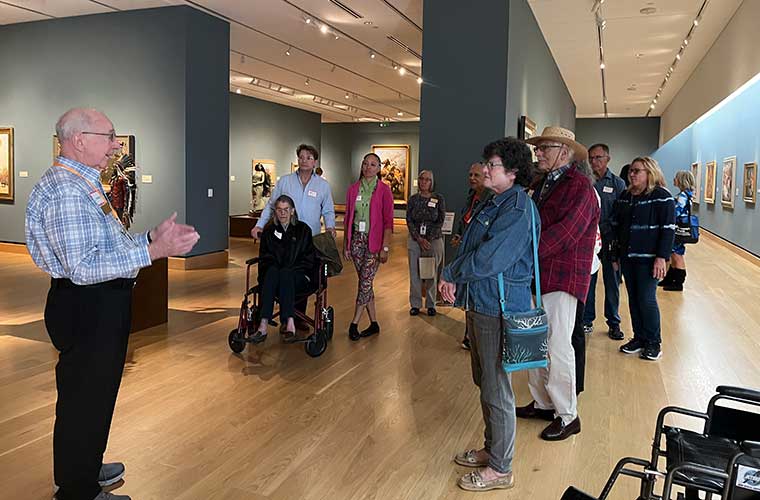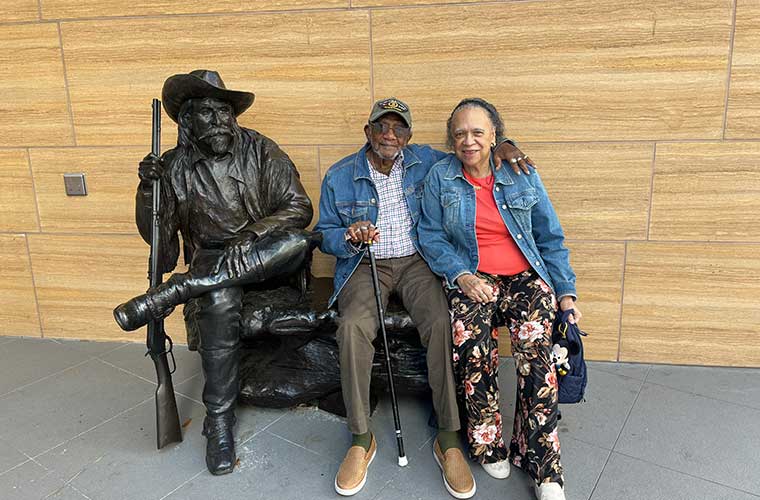St. Anthony's Hospital Marks a Decade of Care for Memory Loss Community

On a recent chilly morning, several patients and caregivers from the St. Anthony’s Hospital Memory Disorders Center met at the James Museum of Western and Wildlife Art in St. Petersburg for a special tour.
Their visit was part of the new Art in Mind program, a collaboration between the museum and the University of South Florida for patients living with memory loss and their caregivers. It’s a way to use art to bring back memories.
The visit marks another innovative step in the care provided by the Memory Disorders Center, which will celebrate its 10th anniversary in April.
“Our goal has always been to provide assistance to those who are facing cognitive challenges,” said Kim Saberi, a masters-level social worker who has been with the center since it opened. She is now the center’s supervisor. “Whatever memory or cognitive loss they face, we’re here to help.”
In 2014, its first year as a place of hope for families who care for a loved one with a memory disorder, the center served 107 families. Last year, the center helped 1,420 families navigate through the complexities that a memory disorders diagnosis can bring.
The center, which is a free service for the community, provides memory screenings, education, planning consultations, caregiver support groups, monthly wellness events and caregiver retreats. The center’s social workers help families determine how to remain as independent as possible while also staying safe.
“The Memory Disorders Center is a part of St. Anthony’s and BayCare’s mission to provide quality care to St. Petersburg residents,” said St. Anthony’s President Scott Smith. “We hope that no family would get this diagnosis. However, when families need us, our team is there to help.”
Since 2014, the center has served more than 7,500 families. The number of older Americans living with Alzheimer’s disease, the most common form of dementia, is growing fast, according to the Alzheimer's Association (www.ALZ.org). An estimated 6.7 million Americans age 65 and older were living with Alzheimer's in 2023, the association said, with 73% of them age 75 or older.
In 2019, the center began seeing inpatients to meet the needs of those who were at the hospital. And the team began to add more events that catered to those with memory loss and their caregivers.
The James Museum tour is a good example of the types of programs the center offers to help families. “This is the most meaningful thing I do,” said Catherine Wilkins, professor of instruction at the Judy Genshaft Honors College, who trains students and docents for the Art in Mind program. “It’s so impactful to see people connecting with art.”
Instead of leading the tour by describing the art or explaining the significance of it, docents introduce ways to take patients into the art through different activities. “The methods that we use in Art in Mind are based on research that has been done in the course of 20 years in the arts community on what interactions with art have therapeutic benefits for people with dementia,” Wilkins said.
In one activity, the tour members chose an object from a docent and then were asked to find something similar in a piece of art. There was lots of chatter between the docents, patients and caregivers as they strolled the gallery. In another activity, they were asked to find a piece of art that related to an emotion.
John and Katherine Murray were asked to find joy. It didn’t take them long to find it in a statue. Murray, a veteran of the Korean and Vietnam wars, has Alzheimer’s disease. But Mrs. Murray said seeing the art brought back his memory especially when he saw a painting of a young Native American man with a rifle.
Michele Valentine, the museum’s manager of docent and group learning, said Art in Mind is exactly what museums should be offering to the community. “When I first entered the field about 12 years ago, museums were very different places. And today I think being able to serve as many people and helping them to experience the joy of art … I think it’s just the best thing for us.”
Saberi learned about Art in Mind from Larry Korth, who was a caregiver for his wife who had Alzheimer’s. Korth and his wife utilized the services of the center for many years before she passed away. He is now a docent at the James and thought this would be a great activity for the Memory Disorders Center, Saberi said.
“We’re all just a big family,” she said. “Many of our caregivers who have lost loved ones do stay in touch by volunteering and helping to raise awareness.”
Having these programs in the community is so important for patients and caregivers, Saberi said. “(These events allow) caregivers and people with dementia to be able to socialize and enjoy the arts in a kind of non-judgmental zone where they can be together … and have a sense of community,” she said. “It is really wonderful that (the museum) has put this program together.”

At the center, Saberi works with Michelle Haner, social worker, and Brenda McClintic, support coordinator. Another innovation at the center is the monthly Mindful Yoga class for caregivers and team members that Haner leads the first Wednesday of every month. The center works closely with the Madonna Ptak Center for Alzheimer’s Research and Memory Disorders Clinic at BayCare’s Morton Plant Hospital in Clearwater.
McClintic, who joined the center in 2022, can relate to caregivers. Her husband was diagnosed with Alzheimer’s in 2013 before the center opened. In early 2015, she sought Saberi’s help to locate a memory care facility for him. He passed away in 2018.
“Working as a support coordinator has been very therapeutic for me,” she said. “I can talk with caregivers and tell them I do actually know what they are going through and let them know they are not alone in this journey. If I can make a difference in just one person it is worth it.”
There is more work to be done, Saberi said.
“More and more people are getting diagnosed with Alzheimer’s disease and other types of dementia as our Baby Boomers age,” she said. “People are staying healthy from so many other things like heart disease … and age is the greatest risk factor for dementia. The longer we live the more at risk we are. That’s why we’ll continue to be here to help.”
For more information, to schedule a free consultation or learn more about the center’s support groups, please call (727) 825-1595 or visit BayCareMemories.org.
